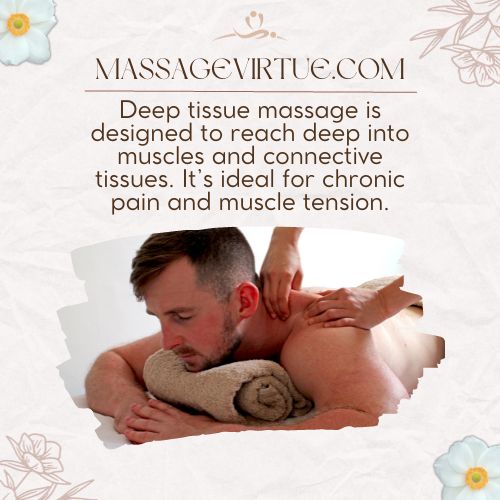Massage therapy is not just about relaxation and pampering; it can also be a powerful tool for addressing various medical conditions.
In this article, we will explore ways of treating medical conditions through massage therapy.
We’ll delve into different types of massage, their benefits, and how to find a qualified massage therapist for your specific needs.
The Healing Power of Massage
Massage therapy is a centuries-old cure for various medical conditions. Let’s have a look at how it can be used to address various illnesses.
1. Massage for Pain Relief
Are you tired of dealing with chronic pain? Whether it’s back pain, joint pain, or muscle soreness, massage therapy can offer relief.

Soft tissue massage, myofascial release, and trigger point therapy are effective techniques for targeting specific areas of discomfort.
These methods help increase blood flow, reduce inflammation, and release tension in the affected muscles.
2. Massage for Headaches and Migraines
Headaches and migraines can be debilitating, but regular massage sessions can help manage and even prevent them.
Through gentle pressure and manipulation, massage can ease tension in the neck and shoulders, which often contribute to these painful conditions.
3. Massage for Stress and Anxiety
In today’s fast-paced world, stress and anxiety have become all too common.
However, Swedish massage, with its soothing strokes and gentle kneading, can promote relaxation and reduce stress hormones.
The power of touch can bring a sense of calm and tranquility to your life.
4. Massage for Depression
Depression can take a toll on both the mind and body.
Clinical massage, when used as a complementary therapy, can help alleviate symptoms of depression.
It encourages the release of serotonin and dopamine, the “feel-good” neurotransmitters, and promotes a sense of well-being.
5. Massage for Cancer Patients
Cancer treatment can be physically and emotionally draining.

Massage for cancer patients, when performed by therapists trained in oncology massage, can reduce nausea, anxiety, and depression.
It can also help alleviate the physical discomfort associated with cancer treatments.
6. Massage for Fibromyalgia
Fibromyalgia is characterized by widespread pain and tender points in the body.
Medical massage techniques can target these specific areas, providing relief from the chronic pain and muscle stiffness that often accompany this condition.
7. Massage for Multiple Sclerosis
Multiple sclerosis (MS) can cause muscle weakness and spasms.
Clinical massage and myofascial release can help improve muscle function, reduce pain, and enhance mobility for individuals with MS.
8. Massage for Insomnia
If you struggle with insomnia, a good night’s sleep may seem elusive. However, massage therapy can promote relaxation, reduce anxiety, and improve sleep quality.
It’s a natural and drug-free way to address sleep issues.
Exploring Different Types of Massage
Now that we’ve discussed how massage can benefit various medical conditions, let’s explore some of the most popular types of massage and their unique features.
1. Deep Tissue Massage
Deep tissue massage is designed to reach deep into muscles and connective tissues.
It’s ideal for chronic pain and muscle tension, using firm pressure to release knots and adhesions, offering much-needed relief.

2. Sports Massage
Sports massage is a favorite among athletes to improve performance and prevent injuries.
It blends stretching and deep tissue work to boost flexibility and reduce muscle soreness, keeping the body in top shape.
3. Shiatsu Massage
Shiatsu, a Japanese technique, targets specific body meridians with pressure.
It effectively alleviates pain, promotes relaxation, and restores energy balance, providing a reset for your body’s harmony.
4. Thai Massage
Thai massage combines yoga-like stretches with massage to enhance flexibility, relieve muscle tension, and induce deep relaxation, offering both physical and mental rejuvenation.
5. Swedish Massage
Swedish massage is the ultimate relaxation choice.
Its gentle, flowing strokes and soothing kneading improve circulation, reduce tension, and promote overall well-being, like a peaceful escape from daily life.
Finding a Qualified Massage Therapist
When seeking massage therapy for medical conditions, it’s crucial to find a qualified and experienced therapist. Here’s how to go about it:
| Heading | Explanation |
| Ask for Recommendations | Start by asking your healthcare provider for recommendations. They may have a list of therapists with experience in treating your specific condition. |
| Check Qualifications | Ensure that the therapist is licensed and certified in massage therapy. Look for additional certifications in specialized areas if you have a particular medical condition. |
| Discuss Your Condition | During your initial consultation, discuss your medical condition and treatment goals with the therapist. They should tailor the massage to your specific needs and preferences. |
| Read Reviews | Check online reviews and testimonials from other clients. This can give you insight into the therapist’s reputation and the quality of their services. |
| Trust Your Instincts | Ultimately, trust your instincts. You should feel comfortable and confident in your therapist’s abilities. |
Final Thoughts on Treating Medical Conditions Through Massage Therapy
Massage therapy is a valuable resource for addressing various medical conditions.
From pain relief and stress reduction to supporting individuals with serious illnesses, massage offers numerous benefits. By exploring different massage techniques and finding a qualified therapist, you can harness the healing power of touch to improve your overall well-being.
So, if you’re considering massage for medical conditions, don’t hesitate to explore this natural and effective form of therapy.
FAQs
Can Massage Help Illness?
Massage therapy can provide relief and support for various illnesses and medical conditions. It can help manage symptoms, reduce pain, alleviate stress, and improve overall well-being.
However, it’s essential to consult with a healthcare provider.
What Body Condition Should Massage Be Denied?
Massage should be denied or approached with caution for:
- Contagious skin conditions.
- Fever or infectious illnesses.
- Recent surgery or injury.
Does Massage Help Chronic Inflammation?
Yes, massage techniques like Swedish and deep tissue can help manage chronic inflammation by improving circulation and relaxing muscles.
Consult a healthcare provider for suitability.
What Are 3 Instances When Massage Is Not Recommended?
- Recent fractures or broken bones.
- Active infections.
- Severe cardiovascular conditions.


